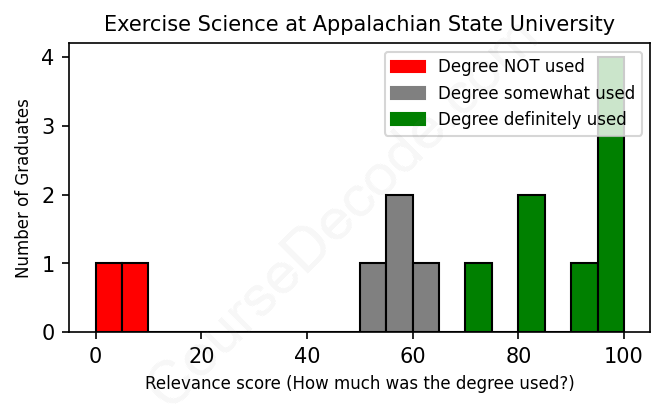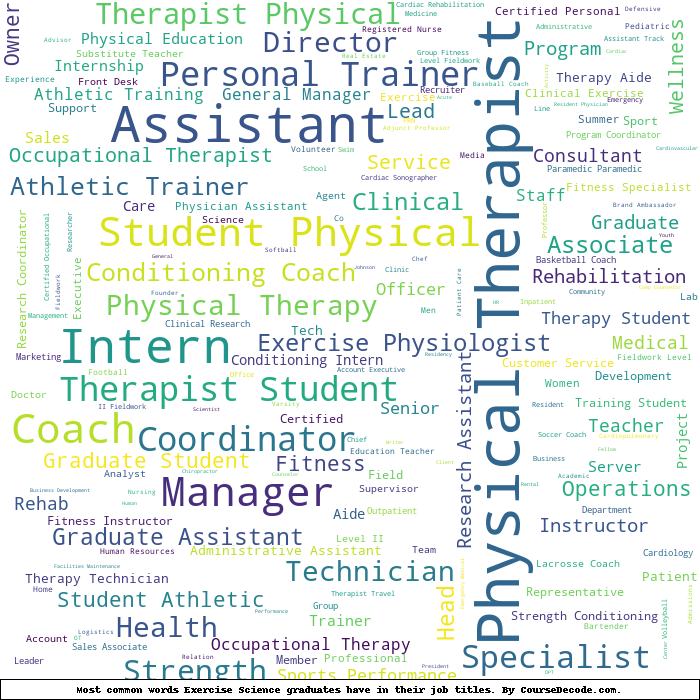
First, some facts. Of the Exercise Science graduates from Appalachian State University we've analyzed , here's how many have used (or NOT used) their degree in their career:

These are estimates based on AI analysis of 14 LinkedIn profiles (see below).
The verdict? Slightly above average. Overall, with an average relevance score of 68%, Exercise Science graduates from Appalachian State University have a slightly higher likelihood (+1%) of finding work in this field compared to the average graduate across all fields:
And for comparison, here's the chart for all profiles we've looked at across all degrees.
Also, after graduating, 50% of these graduates have pursued further education other than another Bachelor's degree (such as a Masters degree or other), compared to the average across all profiles of 35%. This suggests you may need more than just a Bachelors degree to be competitive as a Exercise Science graduate.
See the details:
|
Relevance score: 0% We think this person has NOT gone into a career related to their degree. We think this person has NOT gone into a career related to their degree.
DEGREE INFOGraduated in 2018 from Appalachian State University with a Bachelor of Science - BS in Exercise Science. Also pursued further education since (see below). JOB HISTORY SINCE GRADUATIONMerchandise Coordinator HomeGoods Stores Oct 2018 - Aug 2020 Assistant Manager  Homegoods Sep 2020 - Apr 2022 FURTHER DEGREES DONE SINCE GRADUATINGAssociate's degreeSouth College 2022 - 2024 ABOUTI am a current student at South College in Asheville enrolled in the diagnostic medical sonography program. My expected graduation is March of 2024. I have a bachelors degree from Appalachian State University in exercise science. I have previous work history in retail with HomeGoods starting as a part time associate working my way up to management. I am looking into careers as an ultrasound technician. |
The top 10 most common jobs done by the graduates we've analyzed (ranked most common to least) are:
Looking at the jobs people with an Exercise Science degree from Appalachian State University have landed, it's clear that many of them have pursued careers closely connected to health, fitness, and rehabilitation. A significant number have taken roles like personal trainers, physical therapists, and coaches. These positions directly apply the principles and knowledge gained from their degree, such as exercise programming, human anatomy, and wellness strategies. For instance, many personal trainers at various fitness centers have successfully translated their education into hands-on work, helping clients achieve their health goals. Additionally, roles in physical therapy consistently emerge in profiles, showing a strong link between the degree and practical applications in patient care and rehabilitation.
However, not all roles align perfectly with the Exercise Science curriculum. Some individuals have ventured into unrelated fields like real estate or administrative tasks, which don't require any significant exercise science knowledge. Even within roles that might seem relevant, like managing a pet care business or customer support positions, the direct applications of their degree tend to diminish. So while there’s a solid representation of jobs directly related to Exercise Science, there’s also a noticeable portion of graduates who have found themselves in careers that don't really utilize their specialized training. Overall, if you’re considering majoring in Exercise Science, it's safe to say that there are diverse and relevant job opportunities, but also keep in mind that some paths may lead you away from the core of what you studied.
Here is a visual representation of the most common words in job titles for Exercise Science graduates (this is across all Exercise Science graduates we've analyzed, not just those who went to Appalachian State University):

When it comes to graduates from Appalachian State University with a degree in Exercise Science, the career trajectories vary quite a bit. Right after graduation, many of these individuals often land roles that are closely related to their field, such as personal trainers, physical therapy technicians, or rehab specialists. For instance, graduates from 2012 quickly transitioned into roles like certified strength and conditioning specialists or personal trainers, showing that they are utilizing their education right off the bat. While some did venture into unrelated fields like real estate or teaching, a good number remained in health and fitness, coaching, or physical therapy.
Fast forward to five years later, and it seems like a significant chunk of these graduates has settled into more permanent positions within physical therapy, rehabilitation, or coaching roles. Some have progressed into specialized positions, like occupational therapists or physical therapists, which are definitely in line with their degrees. However, there are also those who have taken a bit of a detour into roles that don’t directly relate to Exercise Science—like being a merchandise coordinator or claims coordinator. Overall, while many seem to have found meaningful careers in health and fitness-related fields, it’s clear that not everyone sticks strictly to Exercise Science, with some exploring other paths entirely. So, if you're thinking about this degree, know that while there's a solid foundation for a health-focused career, there’s also a chance some graduates will drift into different industries.
Getting a Bachelor’s degree in Exercise Science at Appalachian State University is pretty standard in terms of difficulty, so you can expect a mix of challenging and more manageable classes. You'll dive into subjects like anatomy, physiology, and biomechanics, which can get pretty intense, especially if science isn’t your strong suit. However, many students find the coursework interesting and relevant, making it easier to stay motivated. The key is to balance your study time with hands-on experience because practical applications can make the tougher concepts click. Overall, if you’re passionate about fitness and health, it’s definitely doable!
Most commonly, in the LinkedIn profiles we've looked at, it takes people 4 years to finish a Bachelor degree in Exercise Science.
Looking at these Exercise Science graduates from Appalachian State University, it seems like they’ve had a mix of job experiences, but overall, the money situation might be a bit hit or miss. A few have landed solid roles, like physical therapists and a pediatric physician assistant, which can pay pretty well, especially with experience. However, many others took on jobs like personal training or teaching, which often don't bring in a ton of cash initially, even if they can be fulfilling. It seems like they might find themselves better off as they gain experience or shift into higher-paying positions, but starting out, they probably weren’t raking in the big bucks. So, while some are likely doing well, it’s a mixed bag for the others.
Here is a visual representation of the most common words seen in the "about" section of LinkedIn profiles who have a Bachelor degree in Exercise Science (this is across all Exercise Science graduates we've analyzed, not just those who went to Appalachian State University). This may or may not be useful:

Here are all colleges offering a Bachelor degree in Exercise Science (ordered by the average relevance score of their Exercise Science graduates, best to worst) where we have analyzed at least 10 of their graduates:
| College | Score | Count |
|---|---|---|
 University at Buffalo University at Buffalo
|
81 | 10 |
 Grand Valley State University Grand Valley State University
|
68 | 10 |
 Appalachian State University Appalachian State University
|
68 | 14 |
 Slippery Rock University of Pennsylvania Slippery Rock University of Pennsylvania
|
68 | 11 |
 Kennesaw State University Kennesaw State University
|
56 | 10 |
 Brigham Young University Brigham Young University
|
51 | 26 |
 The University of Tennessee at Chattanooga The University of Tennessee at Chattanooga
|
44 | 10 |